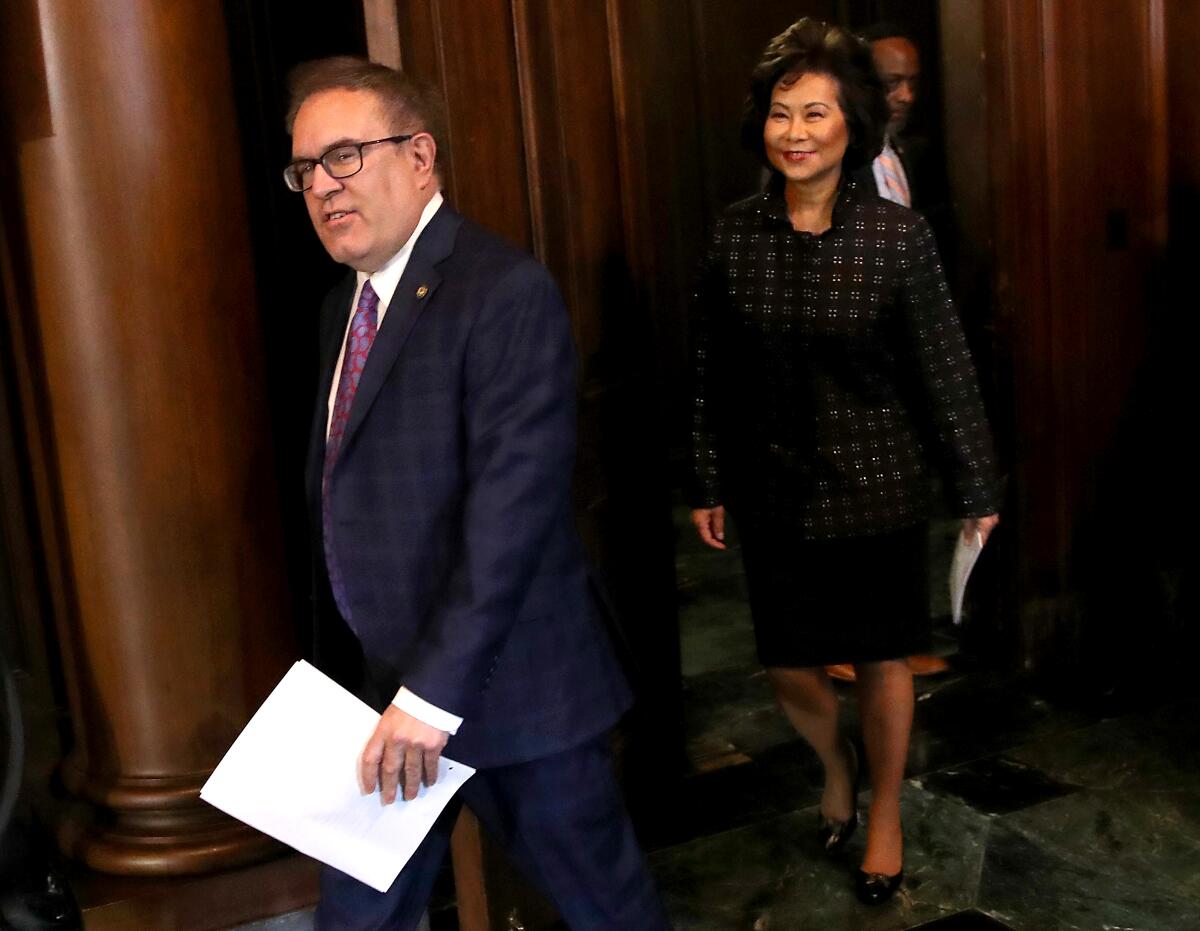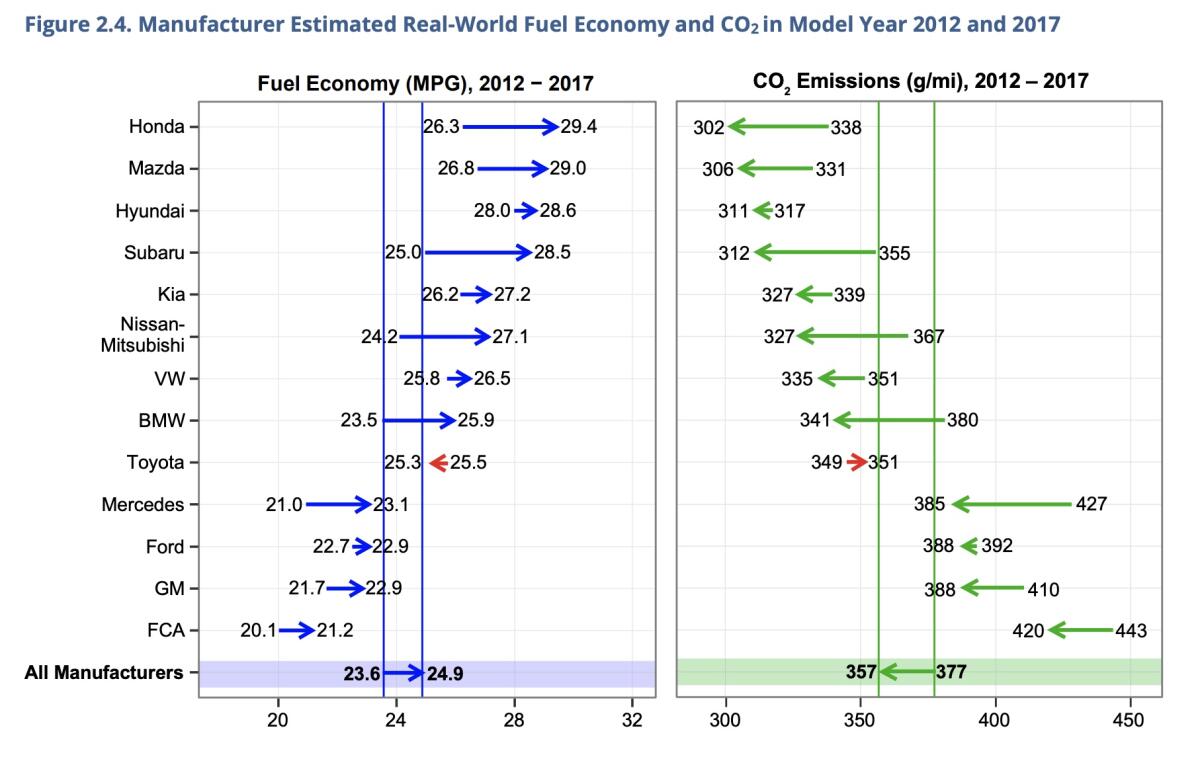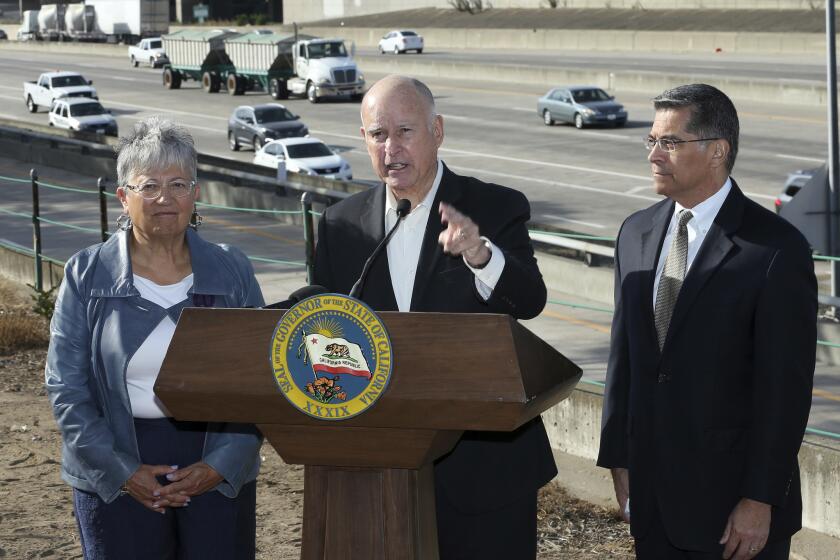Some automakers taking Trump’s side in emissions fight have the worst records on pollution

- Share via
For anyone hoping to solve the mystery of why a group of leading automakers chose to side with the Trump administration in its fight with California over vehicle emission standards, the Environmental Protection Agency may have a clue.
In its latest Automotive Trends Report, an annual publication issued this year in March, the EPA shows every major automaker’s progress on emissions and mileage efficiency for the period 2012-2017. General Motors, Fiat Chrysler and Toyota, the three most prominent manufacturers siding with Trump, stand out — and not in a good way.
GM and Fiat Chrysler ranked at the very bottom of the list of 13 automakers on both fuel efficiency and emissions. Both were worse than the industry average in both metrics. Toyota did better, ranking fifth from the bottom. But it was also the only manufacturer whose figures got worse during the five-year period.
It’s very clear that they are feeling the heat from this administration.
— Dave Cooke, Union of Concerned Scientists, on automakers siding with Trump
By contrast, three of the four manufacturers that reached agreement with California in July supporting more stringent emissions standards through 2026 — Honda, BMW and Volkswagen — scored much better. Honda has the best rankings on fuel economy and emissions of all, and BMW and Volkswagen scored well above average.
That prompts the question whether automakers with the worst records on emissions and mileage naturally, or deliberately, gravitated toward the Trump administration’s position that the existing government rules need to be loosened. The existing rules match California standards for auto emissions, which point to a mileage goal of 54.5 miles per gallon, fleetwide, by 2025.
GM, Chrysler and Toyota are siding with the Trump administration in attacking California’s auto emissions rules.
The Trump administration wants to roll that back to 37 mpg and to revoke California’s waiver allowing the state to set its own emission standard. California’s standard is followed by 11 other states, accounting for roughly 40% of the nationwide auto market.
GM, Fiat Chrysler, Toyota, and a lobbying group calling itself the Coalition for Sustainable Automotive Regulation filed a court motion Monday asking to intervene in a federal lawsuit challenging the administration’s rule proposals. They’re supporting the administration’s position.

Those automakers and the coalition disavow any intention to roll back the emission and mileage standards. They say they’re merely supporting the concept of “One National Program,” that is, a single set of regulations governing emission and mileage standards nationwide. “Regulatory simplicity and certainty are critical to the success of [the intervenors’] members,” the motion says.
We asked GM, Fiat Chrysler and Toyota to comment on whether their records on emissions and mileage might have influenced their decision to support the administration. GM referred me to a release from the coalition, stating in part that “the certainty of one national program ... is the surest way to reduce emissions in the timeliest manner.” The others haven’t responded.
Toyota, however, issued a statement on Tuesday asserting that it intervened in the lawsuit “not as a plaintiff or a defendant, and not to favor any political party,” but “to impact how emissions standards are applied” and to “help forge a sustainable compromise for consumers and the environment.” The company boasted in its statement of “our history of environmental achievements and progress.”
But that’s an outdated claim. Toyota hasn’t led auto manufacturers in its overall fuel economy since 2009. As Sean Hecht of UCLA law school observed in a blog post Thursday, Toyota’s “claim to be an industry leader in vehicle electrification and in [greenhouse gas reduction] was true a decade ago, but isn’t true today.” That should cast doubt on its assertion that it joined the pro-Trump intervention solely to secure a nationwide standard.
It’s proper to observe that automakers’ records on emissions and mileage aren’t a foolproof guide to where they stand on the conflict between California and the Trump administration.
Trump’s authority to revoke California’s waiver from federal clean air rules rests on a very shaky legal foundation.
The Coalition for Sustainable Automotive Regulation includes several smaller foreign auto companies, such as Kia, Hyundai, Subaru and Nissan, which score higher than GM, Fiat Chrysler or Toyota in the EPA rankings. Meanwhile, among the automakers that reached agreement with California is Ford, which ranks third-worst on emissions and mileage on the EPA list, just ahead of GM and Fiat Chrysler.
It’s possible that the decision to side with Trump on the lawsuit was motivated by factors other than progress on environmental goals.
“There is a political calculus,” says Dave Cooke, senior vehicles analyst at the Union of Concerned Scientists. He points out that the big automakers are hoping to persuade Trump to back off from his trade war and tariffs, which have been costly for the automakers. Moreover, the administration has threatened to launch an antitrust lawsuit against the four automakers that signed the agreement with California.
“It’s very clear that they are feeling the heat from this administration,” Cooke told me, “and they are choosing to focus on their immediate concerns on how tariffs are affecting their business, as opposed to their long-term plans regarding sustainability.”
California’s climate deal with automakers shows the proper solution to Trump is to go around him.
To recap the background of the conflict between California and the Trump administration, its focus is California’s greenhouse gas emissions rules as they apply to passenger vehicles. By extension, these affect auto mileage standards, since making cars more fuel-efficient results in lower emissions.
Normally, such environmental regulations are reserved for the federal government. Congress, however, has waived the federal preemption as it applies to emissions, having granted California the right to set its own rules, as long as they’re at least as stringent as the federal rules, in legislation dating back to 1970.
Legal experts say the government’s authority to revoke California’s waiver is dubious and its argument for doing so is thin. The administration contends that the state’s clean air standards are tantamount to mileage regulations, which are preempted by federal law. Its action has already been challenged by a lawsuit filed by California and 22 other states, and by a group of environmental and consumer groups led by the Environmental Defense Fund.
The motion filed by the coalition in the latter case acknowledges that two federal courts, in Vermont and Northern California, have issued rulings rejecting that argument. It contends, however, that because industry appeals of those rulings were voluntarily dropped in accordance with agreements with the Obama administration and could be revived, those rulings are not final.
President Trump’s petty, absurd war with California plumbs new lows as he tries to invalidate the state’s cap-and-trade anti-pollution agreement with Quebec.
California’s determination to forge its own path on climate change despite Trump’s hostility is evident from the agreement the state’s Air Resources Board announced in July with Ford, Honda, BMW of North America and Volkswagen. The agreement upholds the gist of the existing clean air regulations. The deal reflects a compromise translatable into a fuel efficiency standard of 50 miles per gallon by 2026, rather than the existing goal of 54.5 mpg by 2025.
The EPA’s report on automotive trends suggests that the 2025 goals have successfully inspired the industry to make progress on environmental goals. The industry average mileage rose to 24.9 pg in 2017 from 23.6 in 2012, but some manufacturers made greater strides. Honda’s fleetwide mileage average rose to an industry-leading 29.4 mpg from 26.3 mpg. The largest gain was scored by Subaru, whose mileage average rose to 28.5 mpg from 25.0.
The report does tend to confirm the industry’s argument that its mix of automotive models complicates the march toward greater fuel efficiency. “Everyone is selling more light trucks than they used to,” Cooke says. “That’s part of why the overall fleet has been fairly flat in terms of year-over-year improvement.” The light truck category includes most SUVs and minivans, as well as smaller pickups.
Toyota’s unique problem in making progress, Cooke says, may be due to its overreliance on its Prius hybrid electric cars to push its average fuel mileage ahead. But Toyota hasn’t invested as much as other companies in making its heavier vehicles more fuel-efficient.
Generally, the EPA report indicates that vastly improved efficiency is well within the industry’s grasp, if only it invests more in bringing new technologies to the market. For that to happen, however, regulatory pressure must continue — not be reduced, as the Trump administration is attempting to do.
More to Read
Inside the business of entertainment
The Wide Shot brings you news, analysis and insights on everything from streaming wars to production — and what it all means for the future.
You may occasionally receive promotional content from the Los Angeles Times.













